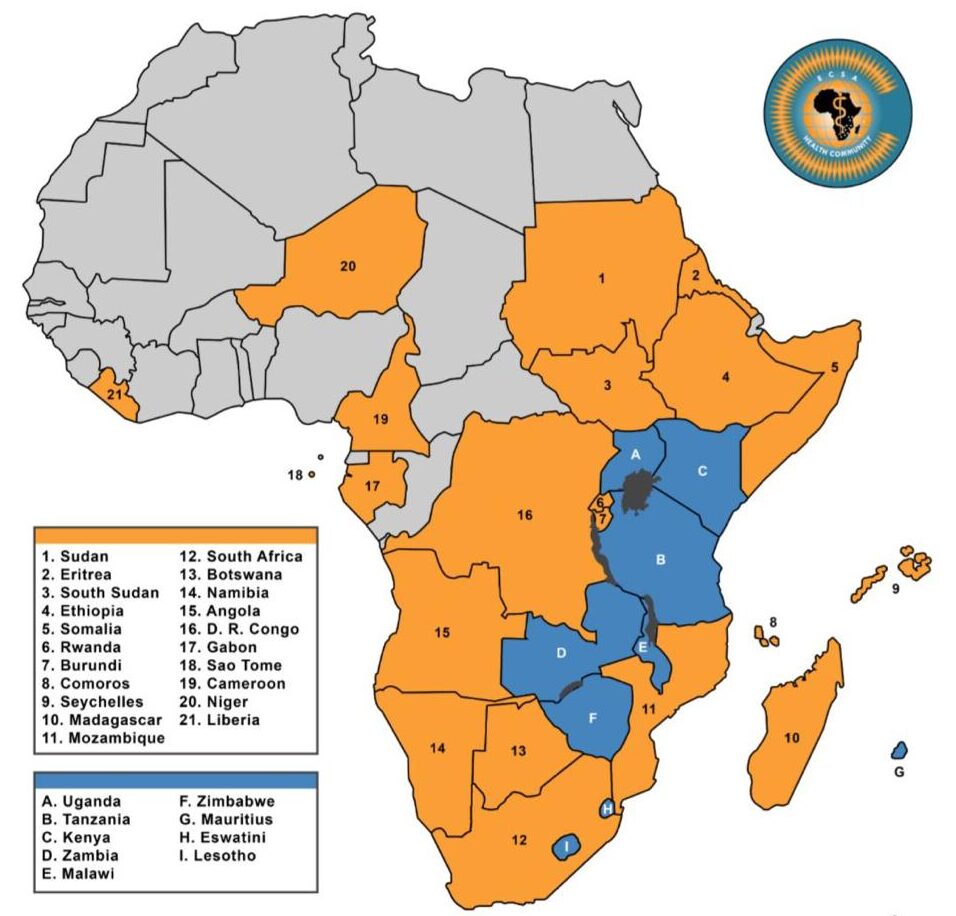The East, Central and Southern Africa Health Community (ECSA-HC) is an inter-governmental health organization that fosters and promotes regional cooperation in health among member states. Member states of the ECSA Health Community are Kenya, Lesotho, Malawi, Mauritius, Eswatini, United Republic of Tanzania, Uganda, Zambia and Zimbabwe.
ECSA-HC was established in 1974 to foster and strengthen regional cooperation and capacity to address the health needs of the member states. Through partnerships with diverse institutions, ECSA’s activities also spread to other countries in Africa to address common health challenges facing the region. Within our projects, ECSA supports non-member states including Botswana, Burundi, Cameroon, Eritrea, Gabon, Liberia, Mozambique, Namibia, Rwanda, Seychelles, South Sudan, Sudan, and Somalia.
The ECSA Health Community works with countries and partners to raise the standard of health for the people of the ECSA region by promoting efficiency and effectiveness of health services through cooperation, collaboration, research, capacity building, policy development and advocacy.

Mandate
The mandate of ECSA-HC is to promote and encourage efficiency and relevance in the provision of health services in the region.
Vision
To be the leader in health in East, Central and Southern Africa, contributing towards the attainment of the highest standard of physical, mental and social well-being of the people in the region.
Mission
ECSA Health Community recognizes health as a fundamental human right. As an inter-governmental organization, ECSA promotes the highest standards of health for the individuals, families and communities through advocacy, capacity building, brokerage, coordination, inter-sectoral collaboration and harmonization of health policies and programmes.
The East, Central and Southern Africa Health Community (ECSA-HC) is a child of the Commonwealth Secretariat. With the collective need for a machinery that will foster cooperation and coordination in health expressed by the Health Ministers of Member countries of the Commonwealth from East and Southern Africa, the Commonwealth Regional Health Community Secretariat of East, Central and Southern Africa was established in 1974.
In 1980, authority and ownership was transferred by the Commonwealth Secretariat (CommSec) to the member countries, who then gave the community a new name: the ‘East, Central and Southern Africa Health Community’ also known as the ECSA-HC. A Convention of the East, Central and Southern Africa was then signed by the Health Ministers. Since then, ECSA-HC functions under the direct control of Member State governments, who see the secretariat as a permanent mechanism for promoting cooperation in health.
Over the last three decades the ECSA Health community has undergone a series of phases of development that underpin its continued existence namely, Foundation years under Commonwealth Secretariat (1974-1980), Regional organization-expansion of activities (1980-1985), Consolidation of regional organization-challenging times (1985-1994), Maturing organization and the strategic approach (1995-present).
The ECSA Health Community continues to enjoy strong support from the member states and partners in the region and beyond and this dynamism is reflected in the continuing portfolio of technical programmes.
In 2007 ECSA-HC built and officially launched a new and modern headquarters building in Njiro Area, Arusha, Tanzania further signifying the level of commitment by member states to the continued existence of the organization.
ECSA-HC supports countries through advocacy, capacity building, brokerage, coordination, inter-sectoral collaboration and harmonization of health policies and programmes. ECSA-HC’s support is defined in the current strategic focus: Human Capacity Development; Health Systems strengthening; Reproductive, Maternal, Neonatal, Child and adolescent Health; Global Public Health Security; Communicable and Non-communicable diseases including all forms of Malnutrition; Policy Advocacy on topical health issues and Research, Knowledge Management and Monitoring and Evaluation.
Beyond support to Member States and neighboring countries, ECSA-HC also provides the following services
- Consultancies in the areas of Health Systems Development, Human Resources for Health; Health Financing; Infectious Diseases and Emergency preparedness; Food security and Nutrition; Health Policy development; Monitoring and Evaluation and Health Research
- Training in Global Health Diplomacy; Leadership and Management and Infectious Disease Laboratory
- Technical assistance in all our specialties as listed above
